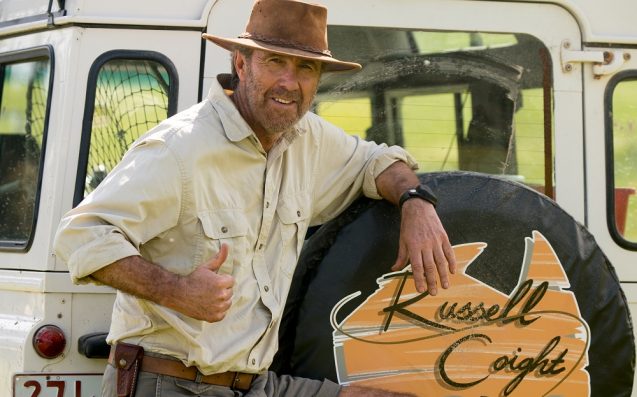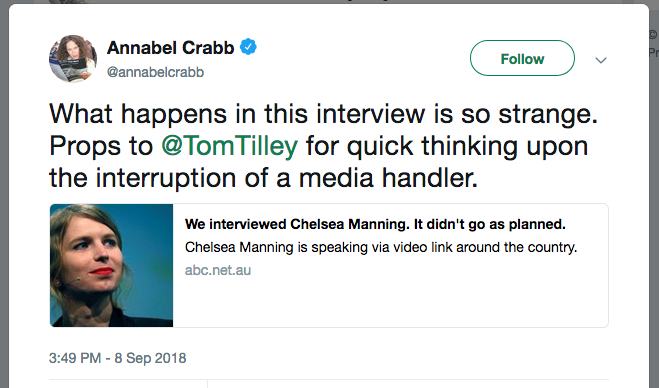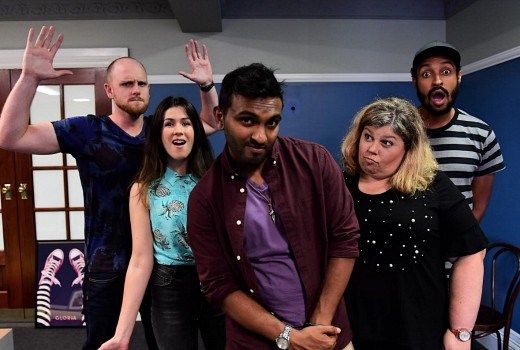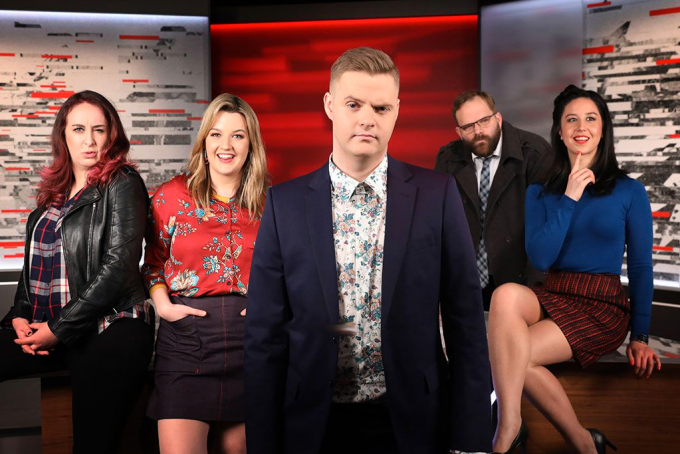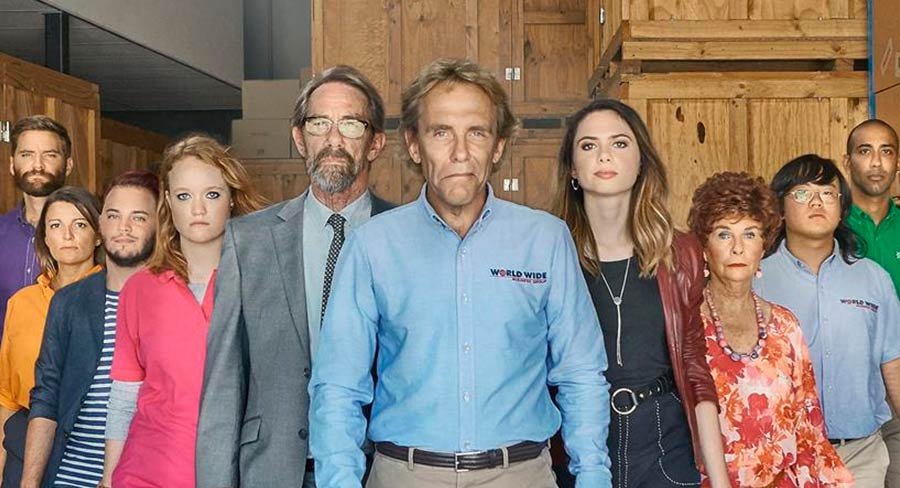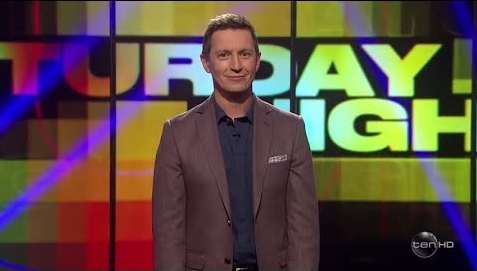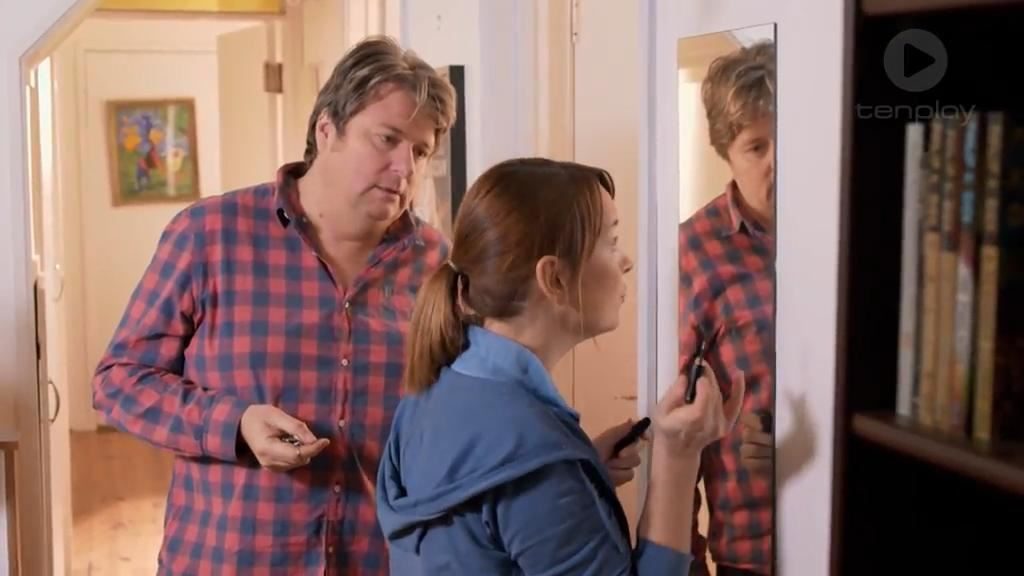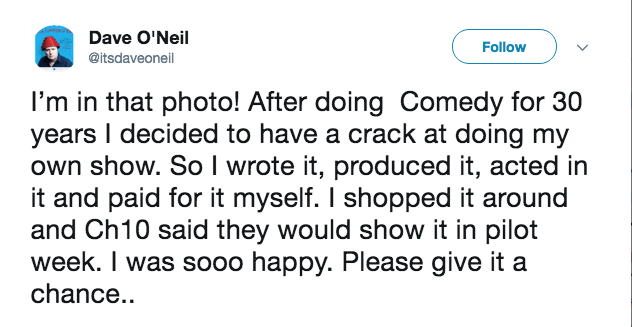Australian Tumbleweeds
Time to Hit the Road: Vale All Aussie Adventures
All Aussie Adventures is about as unfashionable a comedy as comedy currently gets. Despite star Russel Coight’s constant blathering on about conservation and helping out farmers and struggling regular folk, there’s no real political angle here: everything he says and does is completely centered on himself. So if you really wanted to stretch a point, you could argue that AAA is really about a hapless, blatantly incompetent fool looking to exploit elements of Australian mythology for his own personal gain. Is this the most savage take-down of self-serving Australian elites in recent years? Maybe.
Or, you know, it could just be a comedy about a guy who wrecks everything he touches.
All Aussie Adventures is a kind of physical comedy rarely seen on Australian screens. It’s closer to a Road Runner cartoon or Charlie Chaplin short than something like Kath & Kim. And Coight himself is a clown in the truest sense of the word: most of the wacky pranks might take place in the edit – there’s an awful lot of scenes where the camera falls over or is forced to cut away, only to come back to reveal Coight is now hanging off a forklift truck or has just knocked down a wall – but the jokes are physical none the less.
In the two episodes that made up the final one hour special the first had a run of segments involving Coight’s niece, who he was bringing out to the bush in the hope of exploiting her 500 Instagram followers. The jokes that followed could have appeared anywhere; when Coight attaches a blow-up mattress to anything, you know it’s going to explode. The second episode felt like a collection of isolated scenes they couldn’t fit in anywhere else: there were at least three separate segments set on various stretches of water, but in between each one the show cut to a totally unrelated segment set on dry land. And yet the jokes were as strong as any seen in the rest of the series… which isn’t really that surprising as the series only really had a handful of jokes, which were:
a): After an extended set-up, Coight wrecks everything.
b): The voiceover is not great (“one mistake can be fatal or worse – deadly”).
c): Coight’s not good with other humans (ie, trying to get a depressed farmer to admit the rains are good news even as they’re drowning his crops).
Sure, “wrecking everything” can range from accidentally knocking down walls to stepping on frogs to being attacked by a drone to being attacked by a drone tractor to having a trap crush his hand to not catching any fish because his fishing buddy is depressed over the end of his marriage, but it’s basically the same joke.
Fortunately it’s a pretty good joke, and Glenn Robbins as Coight is excellent at selling Coight’s mix of bluster and flailing about. He’s Australia’s Alan Partridge, only there’s never been any real effort to deepen the character (a few one-joke references to his earlier media career aside) – maybe because Partridge got there first, maybe because all the fun of Coight is that he’s basically an indestructible cartoon character who is reset at the end of every scene. He’s killed so many native animals it’s a wonder he’s allowed on Crown Land and he’s a total menace to life, limb and property; no wonder they had to wait 15 years between the second series and this one.
But while this third series was still more of a pretty good thing, there’s only so far you can take one joke. And a fourth series seems unlikely anyway, what with the lengthy production time (this was originally meant to be broadcast in 2017) and the somewhat, uh, repetitive nature of the jokes. Plus Ten seems to be going in yet another “exciting” new direction for 2019:
A few years ago, the prospect of wall-to-wall reality TV seemed inevitable; a genre destined to swallow all others. Which makes Network Ten’s embrace of classic entertainment programming a surprise.
In 2019, Ten will revive Dancing with the Stars – axed by Seven in 2016 – and launch Sunday Night Takeaway, based on a hit UK variety series. A local version of Celebrity Name Game, adapted from a US format, is also in the works.
Dancing with the Coight, anyone?
Oh, We’ve Got a Prediction For You
Press release time!
Charlie Pickering and Annabel Crabb to host show that predicts the unpredictable
Production will soon commence in Melbourne on an exciting new weekly panel show,Tomorrow Tonight, to be hosted by ABC favourites Charlie Pickering and Annabel Crabb, and produced by the team behind The Weekly with Charlie Pickering and Hard Quiz.
Each episode Charlie will introduce Annabel and a panel of experts and comedians to a story that would have us all glued to the news – an event that hasn’t happened yet, but could. Funny, illuminating and occasionally terrifying, Tomorrow Tonight will bring you tomorrow’s news today and show us that the future is predictably unpredictable.
Tomorrow Tonight is the comedy panel show that gets ahead of itself by running out in front of the news cycle. As the world goes off script it is time for a show that takes a long, hard and hilarious look at “what happens next”.
“I’m excited to take a break from making fun of the news to have a go at making up some news of our own, which could all turn out to be true any day now.”
– Charlie Pickering“The escalating lunacy of domestic and global events in recent years is a sombre reminder to us all that we should be prepared for things to get even weirder. Tomorrow Tonight is – under these circumstances – a cornerstone obligation of the ABC Charter. Jokes included at no additional public expense.”
– Annabel Crabb“We are thrilled to work with Charlie Pickering and Annabel Crabb and the team at Thinkative Television on this original production. Tomorrow Tonight will unpack some of the most burning issues of our time and ask: ‘What if?’ Tomorrow Tonight joins ABC shows such as Gruen, Shaun Micallef’s Mad As Hell, The Weekly with Charlie Pickering and Hard Quiz in informing and entertaining viewers about the world around them and the world to come.”
– Josie Mason-Campbell, ABC Head Factual & EntertainmentTomorrow Tonight will air later this year on the ABC.
Where to begin with this turd exciting new development? This is a press release that starts out describing Charlie Pickering as an “ABC favourite” and ends with claiming that Hard Quiz is “informing and entertaining viewers”; if we weren’t feeling queasy about this Hypotheticals reboot before today we’re actively vomiting at the thought now.
Hey, see that list of “informing and entertaining” shows at the end of the press release? Here’s two shows that aren’t there: The Checkout and Tonightly. Because despite actually being both informative and entertaining, they were both axed this year. But don’t worry – the money the ABC saved by not renewing those shows is being spent on this instead. This is how the ABC wants to spend their diminishing funds; on giving you, the audience, more time to hang out with your “ABC favourites”. Jesus wept.
Also confusing: why two hosts? Charlie Pickering walks out, introduces Annabel Crabb and then… what? This might possibly make sense if Crabb was replaced by anyone else a regular panelist with relevant skills, but whatever you might think of Crabb – and more on that in a minute – she’s not really great when it comes to speculating on future events. Or interpreting current events when a fellow journalist stuffs it up:
Look, we get it. The ABC needs some in-house talent to host the shows that upper management wants to make. But eventually someone at the ABC is going to realise that by getting their “talent” to host stuff like this they’re actively devaluing the “talent” they’ve invested so much money on.
It’s one thing to get Tom Gleeson to host Australia’s most forgettable quiz show; it’s another to turn Annabel Crabb from a mildly respected political journalist wearing Marieke Hardy’s cast-offs into an apologist for death camp commandants. Oh wait, that already happened with Kitchen Cabinet. Let’s rewatch that episode where fucking “ScoMo” made lunch while refugees killed themselves in his offshore detention camps, shall we?
Obviously the ABC can redistribute their budget how they see fit. And if they want to give more work to a host who’s failed to ignite any real excitement or interest after the ABC paid a fortune to give him (and then renew, and renew) his own largely ignored and often reviled show, that’s their business. But this is still a bad idea on a basic programming level.
Geoffery Robinson’s Hypotheticals featured an authentically intelligent host who could believably create a scenario then throw in developments based on real-world situations which his panel – mostly made up of at least slightly serious people whose answers reflected what they (or people like themselves) would do for real in these situations – would then answer seriously. In contrast, this is shit.
Hypotheticals worked because it took its crazy scenarios seriously. This is hosted by Charlie Pickering, who clearly takes himself seriously but treats everything else around him with thinly veiled contempt, and Annabel Crabb, who is a “fun” political reporter best known for telling the general public that politicians running detention camps are really top blokes when you get to know them. It’s going to be an episode of Theatre Sports where the improv teams are made up of politicians, columnists for The Australian and Matt Okine. The only thing anyone is going to learn when this goes to air is how fast they can change the channel.
Here’s a hypothetical for you: would we be getting this show if The Chaser were still making television at the ABC?
Diverse sketch comedy is the new black
Just when we thought diverse sketch comedy had died in this country following the axing of Tonightly, Seven has announced a new show starring Nazeem Hussain…
Cast revealed for Seven sketch comedy Orange is the New Brown
Great to see Seven getting back into the sketch comedy business with upcoming series Orange is the New Brown.
Nazeem Hussain (Salam Cafe, Legally Brown, I’m a Celebrity Get Me Out of Here) fronts the 6 part series from Screentime.
Also featuring are Urzila Carlson (Have You Been Paying Attention?), Becky Lucas (Disgrace), Matt Okine (The Other Guy) and Broden Kelly, one third of comedy group Aunty Donna.
Making appearances are Kat Stewart, Claudia Karvan, Tim Minchin, Gary Sweet, Firass Dirani and Sigrid Thornton.
The series written by Hussain, Joel Slack Smith, Sophie Braham, Richard Thorp, Penny Greenhalgh, & Heidi Regan tackles everything from a Real Housewives-type melodrama set in a prison to racial stereotypes when playing charades.
“This was a really fun show to make” said Hussain. “I got to see things I thought I’d never see. Kat Stewart dating a 95-year-old man, Tim Minchin arguing with Kamahl and Sigrid Thornton getting frisky with a skeleton.
“But to be honest I’m just using this show as a stepping stone to Home and Away. Any role will do. I’d even settle for the Uber Eats driver at the diner.”
Seven is yet to announce an airdate.
Possibly the key phrase here is “Seven is yet to announce an airdate”, which begs the question: why announce the show? Could it be an attempt to subtly point out that unlike Ten and their Pilot Week, Seven is prepared to make and air comedy starring a non-white comedian and featuring a number of women in key creative roles?
Either way, and while it’s always good to see the commercial networks making any sort of comedy, this sounds like it’ll be…broad, where the laughs come from “I know the TV show they’re parodying” or “Look, it’s that famous person in a weird situation”. We also suspect this will be a lot like Ten’s Pilot Week show Skit Happens, a show which featured the un-holy trinity of sketch comedy shows:
- An ensemble cast who’ve never worked together and therefore had no rapport
- Sketches about things the target audience are likely to be familiar with rather than sketches which are funny in and of themselves
- Recurring characters who recur far too often
That Real Housewives parody they mentioned? It’ll be a running sketch popping up three or four times an episode, every damn episode, whether it’s funny or not.
Call us cynical, but we’re not holding our breaths that this will be any good.
In other sketch comedy news, the third series of Black Comedy starts on 19th September. And while it’s not the greatest sketch show ever, it at least has had the sense to retire characters it’s done to death – and it’s not afraid to go in hard when it comes to political matters. Also, after several series, its core creative team know how to work together, which means this’ll probably be the show’s best series yet.
Vale Tonightly
There was a moment in the final episode of Tonightly with Tom Ballard last night when Ballard rightly called out the people who’ve been saying that Tonightly only got funny after it was axed. And while the last few weeks of Tonightly have been some of the most interesting, experimental and spirited, Ballard had a point.
We’ve watched almost every episode of Tonightly, more than 140 of them, and in our view, it started out funny and it ended funny, with a lot of funny in between. And how many Australian comedy shows can you say that about? We’ll wait… Now list all the Australian comedy shows that went to air multiple nights a week that you can say that about…
In the view of this blog, Tonightly, while far from perfect, achieved a huge amount that was positive in its nine months on air, and its axing is a great loss to anyone who likes satire, comedy, politics, current affairs or televised pissfarting about.
Tonightly was, ironically, the “fresh approach” the ABC wanted. It paired well-known faces with emerging talent, it had a majority female core cast, it opened its doors to guest presenters, stand-ups and musicians, and it featured stories on a wide range of issues from people of colour, the LGBTQI+ community, refugees, rural Australians, indigenous Australians, religious people, non-religious people, and politicians and activists from all sides. Name any other program that’s been doing that.
So, why, after all that was it axed? Because the publicly-stated reasons were pretty vague.
One theory is that in the current climate of threats to either defund the ABC or slash its budget, and as a result of the ACMA investigation into that c-word sketch, the ABC was under pressure to kill the show. And while that’s very possible, the more likely and more obvious – and certainly more provable – reason is that no matter how consistently interesting or good Tonightly was, not enough people were watching it.
If you’re a public broadcaster airing a popular show and the government are asking you to axe it, it’s easy to refuse. But if you’re a public broadcaster airing a little-watched show and the government are asking you to axe it, it’s hard to say no. Especially if it’s life or death for your organisation.
So, why wasn’t a good show rating? Was it the fact that it was on ABC Comedy? Was it the fact that its target audience of young people don’t watch TV? Or the ABC? Perhaps the big problem here wasn’t so much that Tonightly didn’t appeal to young people but that the ABC are crap at building channels and platforms that young people will watch content on. Perhaps a greater investment in comedy for YouTube or social media may have worked better for the ABC than commissioning a comedy TV show. Perhaps those are the “bold approaches” the ABC intend to follow in the future? Just a thought.
So anyway, farewell, Tonightly, we enjoyed your work. Especially the way it’s gone a bit weird and wonderful and don’t-give-a-fuck in the past few weeks. We’ll end this blog with two sides of Tonightly’s diverse coin, the stupidest comedy character for ages, Mr Oily…
…and this blistering monologue from Tom Ballard that perfectly sums up the political events of the last week, and the last few decades. And demonstrates the importance of satire, alternative voices and public broadcasting. We ask again, where else can you find this in the Australian media landscape? Answer: Nowhere.
Shonky is My Business: Business is Good
The original Very Small Business was basically a two-hander: Don Angel (Wayne Hope) ran a collection of shady businesses while his sad sack offsider Ray Leonard (Kym Gyngell) wrote articles for Don’s publishing “empire” and mused on how life had brought him so low. it was hilarious; it was also a savage attack on the myth of the salt-of-the-earth small businessman. For reasons never properly articulated, it only lasted one season; now, a full decade later, it’s back.
Somewhat surprisingly, Don’s empire now actually is an empire… well, he seems to have a range of brands under the World Wide Business logo, each with their own staff member and range of shoddy merchandise (watermelon beanbags, avocado cushions, strawberry pencil sharpeners) that they’re trying to sell at massive markups. The one business that does seem to be bringing in some much-needed cash – Don needs to buy an extremely expensive Range Rover so he can make a splash arriving at the local Small Business Awards – is the internet influencer one run by his daughter Sam (Molly Daniels). And even there Don is constantly sticking his oar in doing more harm than good because he’s basically an arrogant human being with very little to be arrogant about.
The large cast are mostly skimmed over this episode and most of them barely register; so far the highlights come when we get to see the various complicated scams WWB is up to. Sam locks in an AFL player to flog sunglasses, only to have his agent cancel the deal; her choice of a replacement (a porn star) doesn’t go down well. Meanwhile Ray – who, for his sins, is now in charge of the Don’s Dirty Dog Wash franchise scheme – uses the sad story of his life (wife left him, partner left him, daughter turned out not to be his, daughter is now his trans son) to win over clients wavering about signing on the bottom line: clearly hanging around Don for the last decade has taught him a thing or two.
Don is a monster, almost completely devoid of likable qualities: he’s barely competent at sales, awful at employee relations, is driven almost entirely by ego (and his bowels) and spends much of his time spouting cliches about how he’s the driving force of the Australian economy. So if you’ve ever had to spend any time with a small businessman (or woman), he’s extremely recognisable. “You’ve heard of the trickle down effect? I’m the person it trickles down out of”.
He’s also very funny, though the more you’ve had to deal with his type the funnier he is; seeing this particular kind of self-aggrandising blowhard get skewered dead-on is very satisfying indeed in a country where pretty much our entire social and political system is built around blowing smoke up their arse. Getting paid peanuts while your boss goes on about how he should be lauded for being a “job creator” before he heads home early in a car worth more than your yearly pay packet? Yeah, that’s a thing in Australia.
But aside from that? Well, like we said, the scams and schemes were interesting; someone’s done their research there. And Sam is a solid addition to the dynamic, though one episode in and we’ve already had enough of the “wow, young people’s talk is totes amazeballs” jokes. Don’s an old fart; we get it. That’s probably the most likable thing about him.
Don is strong enough of a character to carry a show by himself; this could work (though probably not on the ABC) as simply a series of monologues. So our big worry here is that the more the show focuses on everyone else, the less it’ll be making use of its biggest selling point. After one episode it seems to have got the balance right; so long as he’s on the other side of the screen, too much of Don Angel is never enough.
Sheilas
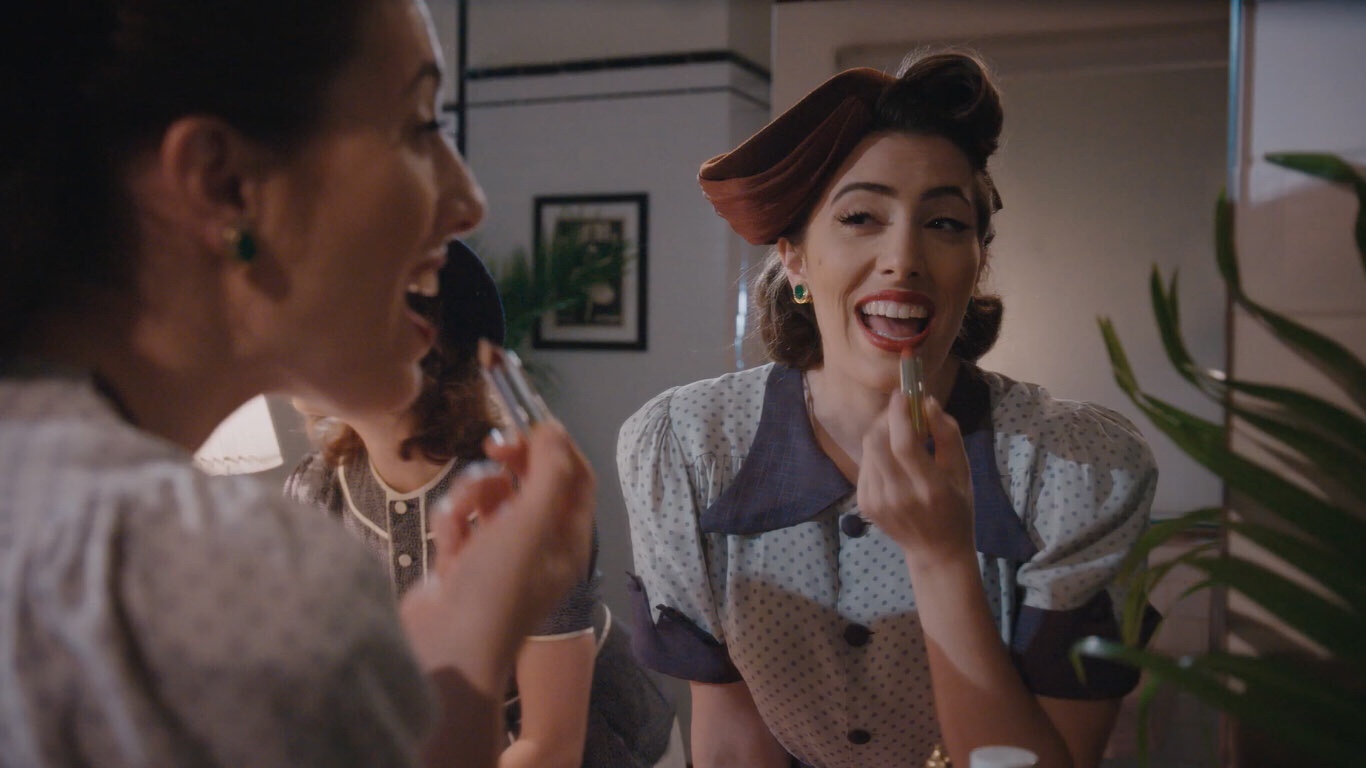 It’s possibly just a coincidence that the new web series Sheilas, a comedy look at semi-forgotten female figures of Australian history, has launched a week after Drunk History. Although clearly in the minds of TV producers, pisstakes of the past are considered a comedy goldmine. Or were a couple of years ago…
It’s possibly just a coincidence that the new web series Sheilas, a comedy look at semi-forgotten female figures of Australian history, has launched a week after Drunk History. Although clearly in the minds of TV producers, pisstakes of the past are considered a comedy goldmine. Or were a couple of years ago…
In the case of Sheilas, it was announced in 2016. Drunk History, we’re guessing, has been gestating for a similar period of time. So, that’s two years (possibly longer) to make and release four 8-minute long webisodes and one 25-minute long pilot based (or on a similar theme to) an American concept created in 2007. That says a lot about the Australian TV industry.
Anyway, of the two shows, Sheilas is the stronger and more interesting. Its makers, Hannah and Eliza Reilly have some experience of making comedy in this style (doing a comedy narrative over some amusing footage) and have a clear passion for the subject matter (women not behaving how they’re supposed to).
In their (less good) ABC series Growing Up Gracefully, a pisstake of etiquette and lady-like behaviour, their ironic commentary over footage of them trying to do feminine stuff, like sit or walk correctly, was the comic highlight. Whereas in each of the four episodes of Sheilas, the Reillys tell us about a great Australian woman – WW2 spy Nancy Wake, champion swimmer Fanny Durack, bush ranger Mary Ann Bugg and feminist activist Merle Thornton – while actors reconstruct the key moments in each woman’s life, but with a contemporary spin.
In the Nancy Wake episode, we see Wake (Cecilia Morrow) in occupied France, taking out Nazis like she’s Schwarzenegger, and in the Mary Ann Bugg episode we see Bugg (Megan Wilding) post-robbery, living a bling lifestyle, complete with cash cannon. It’s funny because they didn’t have assault rifles in the 1940s or cash cannons in the Victorian era.
To be fair, it actually is funny. The juxtaposition of then and now isn’t overdone, and the cast and the Reillys play it perfectly. It’s certainly funnier and more interesting than Drunk History, where the main joke in the re-enactments seemed to be the actors mouthing what the pissed narrator said.
Sheilas wins out in other areas too, not least that the stories in Sheilas are less familiar and therefore more interesting. Most people watching Drunk History already know the story of Ned Kelly, whereas a lot less viewers of Sheilas will be familiar with Mary Ann Bugg (here’s something interesting that the Reillys point out: there are 11 films about Kelly and none about Bugg).
It’s also nice to see a show rely on writing for its laughs. Drunk History isn’t really about the writing; it’s about a pissed person trying to tell a story. Sheilas, meanwhile, is about the script and about the idea, and it wouldn’t work unless the script was good. Which, happily, it is. Perhaps there’s hope for Australian comedy scriptwriting yet?
Pilot Week Day 7 and Wrap Up – Saturday Night’s Alright For Fighting
Pilot Week’s final installment Bring Back… Saturday Night was in many ways the least surprising: Rove doing a live tonight show. Now there’s a fresh new format.
The show itself was… fine? Rove is Rove, which is to say he’s the best light entertainment host in the country so long as you don’t expect him to be funny. The show itself moved along at a decent pace, which we actually liked – it seems for some people out there “live TV” means “endless fucking waffle why not just bring back Daryl Somers while you’re at it”, but shouty and frenetic is no bad thing when you’re being filmed in a tiny shed – and while the various segments were a bit hit and miss, for a 70-minute show it generally held together well. Our advice would be more Judith Lucy, less Merrick Watts, no Tom Gleeson, but that’s a good motto in general.
The problem with live variety these days is… who’s it actually for? Especially when “variety” basically just means a talk show with a musical number thrown in. Variety television worked when television was most people’s only home entertainment option and so a show that lumped a bunch of things together could expect to pull a wide audience: these days people only watch shows that feature things they actually want to watch, and “variety” in and of itself is rarely one of those things.
That said, this is one of the few Pilot Week shows we could see actually working. Saturday night is a television dead zone, so if they could make it cheaply enough – and with Rove’s company already making The Project for Ten, there may be a way to spread the costs – the pressure would be off as far as dumping it for something more profitable (well, until Ten got some sporting rights back at least). And this kind of show has a bunch of side benefits for a network: it’s handy for cross-promotion, it gives overseas guests somewhere to appear (which advertisers always appreciate), and it gives the network a friendly face or two that helps for branding purposes. Plus it’s Rove: you give him a show like this and he’s not going to mess it up.
On the flip side, no-one cares about variety and no-one gives a fuck about Saturday nights. Tough call.
*
So what about Pilot Week as a whole? Well, as a publicity stunt from a cash-strapped network who got to throw on a bunch of shows that cost them basically nothing and let them pretend the audience was going to have a say in which ones went to series, it was fine. But if you were expecting anything more than that, you were shit out of luck.
Sure, maybe Network Ten really will pay attention to ratings and social media reactions when it comes time to deciding which one of these pilot to take to series*. But if you watched any of Pilot Week as it happened, you probably noticed a commercial or two promoting Ten’s upcoming Footballers Wives-esque drama series Playing For Keeps. Funny how that didn’t have to go through Pilot Week before getting picked up. Funny how it was only a collection of below-par garbage shows that Ten threw out there to fight for your love.
But if we were given the power to choose, which ones would go to series? Trial by Kyle was a prank played on the viewers; no. Skit Happens was the same sketch show we’ve been making in this country for a decade without success: no. Dave was Dave O’Neil’s vanity project, and while it showed promise Dave O’Neil is not currently a leading man; no. Disgrace was well titled: no.
After that things get marginally more interesting. Taboo was a decent show… for the ABC or SBS. On Ten? Bit iffy. Likewise, Drunk History would probably work well on Foxtel or Stan, but on Ten it felt a little slight – especially as it wouldn’t have the star power of the similar True Story with Hamish & Andy. If Ten picked up either it’d be a bit of a break from being the network that commissioned Cram!, that’s for sure.
We’ve made our case for Bring Back… Saturday Night above: that just leaves Kinne Tonight. We couldn’t say this was the best show of Pilot Week with a straight face, but it was probably the best all-round product: it was a better sketch show than Skit Happens, Kinne is a decent host and the “live” side of things was strong, and it wouldn’t take much to incorporate a “true story” segment into the show if they didn’t want to go all in on Drunk History. if it had just been funnier it would have been the clear winner: then again, if it had been funnier it wouldn’t have been part of Pilot Week.
Really though, none of these shows in their current form deserve another shot. Comedy on the commercial networks is still a tricky business to get right, and compared to previous years we’re living in a golden age, what with True Story, Have You Been Paying Attention and Russell Coight’s All Aussie Adventures doing well. The last thing we need is yet another crap unfunny comedy lurching onto our screens and stinking up the place so badly all anyone takes away from the mess is that Australian commercial television should leave the funny stuff well enough alone.
And if you disagree… well, Pilot Week may be over, but there’s still new episodes of Street Smart being shown each week.
*the answer, obviously, would be ‘none of them” as nothing in Pilot Week did better than 500,000 ratings-wise, which technically makes them all flops – especially as most did worse.
Number One with a Bullet
Press release time!
Spicks and Specks reuniting to celebrate ABC’s Ausmusic Month
Hands on buzzers, it’s time to play Spicks and Specks! ABC is thrilled to announce that Australia’s favourite music quiz show is coming back for a one off, one night, hour special. Kicking off ABC’s Ausmusic Month in November, Adam Hills, Myf Warhurst and Alan Brough are gearing up to celebrate Australian music as only they know how; with returning old favourite games, some new surprises, and of course plenty of laughs.
Our team captains will be joined by award-winning rapper Adam Briggs, singer, songwriter Ricki-Lee Coulter and comedians Frank Woodley and Denise Scott. Dropping in on the night will be a fantastic line-up of Australia’s music greats, both past and present. They’ll all play along, put their music knowledge to the test, share their anecdotes and perform live.
With our favourite comedians also joining in, the Spicks and Specks Reunion Special promises to be an unforgettable night of music and madness.
The Spicks and Specks Reunion Special will screen as part of ABC’s annual Ausmusic Month in November. For the month of November, ABC celebrates and embraces Australian music across all its platforms with special initiatives, live performances and programming, highlighting and paying tribute to the diverse, depth and variety of Australian music. Stay tuned for more Ausmusic Month highlights.
Yaaaay! Finally Josh Earl, Adam Richard and Ella Hooper will get to make their triumphant… oh, wait. It’s not the 2014 reboot reunion we’ve all been waiting for? Bugger.
Just to get in early before all the “why oh why did the ABC ever let it go?” hot takes, here’s why Spicks and Specks mk.1 ended:
a): The ABC was getting rid of all of its in-house productions, for reasons that were never particularly clear but almost certainly driven by ideology – mostly the belief that the private sector is always better at everything. How’s that working out?
b): Spicks and Specks was put together on a punishing schedule – at least some of the main cast had been complaining for years about its rush job approach to production. Basically, the leads were burnt out; the ABC had killed the goose that laid the golden eggs.
So while b): explains why all your favourites left, a): explains why the ABC didn’t – at first – simply recast the main hosts and keep it going. Which would have made a lot more sense than the fuck-up approach they ended up taking once someone there realised the show that had been the ratings lynchpin of the ABC’s Wednesday night line-up (you know, the night where they actually used to win the ratings) had slipped away.
Don’t worry though, because back in 2012 the ABC had a sure-fire replacement all lined up to take Spicks and Specks‘ place in our hearts and on our screens for the next 27 weeks and beyond. Get back to us when they do a reunion special for Australia’s favourite word-based quiz Randling, ok?
Pilot Week Day 6 – it’ll make you hungry
As the only sitcom of Pilot Week, Dave O’Neil’s Dave looked like a breath of fresh air. Until we started watching it.
Dave is about one day in the life of Dave O’Neil, suburban comedian and family man. He takes his kids to school, hangs out with his mates, has to find a famous friend to host the high school fete, and struggles with the burden of being famous enough that people know him without being famous enough that people respect him.
For a while – a long while – after Curb Your Enthusiasm first aired, there was a rush of Australian comedians pitching shows that would be about them and their wacky yet also extremely relatable upper-middle-class lives. Peter Moon did one. Nick Giannopoulos tried to do one. Dave Hughes sort of did one. And now Dave O’Neil has done one. So it’s safe to say this is a straight-down-the-middle pitch to “mainstream Australia.” If you’re hungry for jokes about how much Dave likes his food, you won’t go starving here.
O’Neil has been working off-camera as a writer for decades on countless Australian comedy series, so script-wise this is pretty tight. There are call-backs, running gags, plot twists that make sense, and a few nice moments of character work (ie, Dave’s wife’s slightly OCD worries about leaving the hair straightener on). The suburban locations were good, the cast were strong, and if none of the side characters really made much of an impression past the initial joke… well, this is a pilot: those roles would almost certainly be recast anyway.
Here’s a problem we didn’t think we’d have with Dave: it turns out Dave O’Neil isn’t a great actor. He’s playing a lovable, slightly beleaguered suburban dad, but O’Neil – who’s a likable performer – constantly defaults to a kind of broad comedy bluster that feels a little put on. It’s sketch comedy acting in a sitcom that’s largely aiming for naturalistic, and it means we never quite click with “Dave” the way this kind of story requires us to.
Sure, loads of sitcoms have been built around stand-ups who aren’t great at acting. But this isn’t like Seinfeld where Jerry Seinfeld is part of an ensemble and is deliberately playing a kind of stand-offish jerk: this is a show about Dave O’Neil, where he’s the focus of literally every single scene. He’s got a couple of scenes next to Glenn Robbins and Robbins – playing a character that is if anything slightly less realistic than Dave – is totally relaxed and believable as his character in a way that Dave never quite is.
Are we saying Dave O’Neil is so bad an actor he can’t convincingly play himself? Yeah, nah: just being yourself in front of a camera is extremely difficult, and it’s not a surprise that O’Neil – who’s on-camera work has either been in sketch comedy or playing a comedy version of himself on panel shows – might seem a little forced in a half hour sitcom built around himself. It’s not that he’s not funny either; it’s easy to see him being hilarious in a different kind of sitcom where his broader performance was more in tune with the general tone. But here, in a sitcom shot entirely on location with a cast of professional actors and a story that’s clearly meant to be a slightly heightened version of reality, his performance is just a little bit out of wack.
So should this go to pilot? Well… maybe not this exact show. But a show a lot like this – one where maybe there was a stronger supporting cast, even one where the focus was shifted slightly (O’Neil would be a great dad in a sitcom where the focus was on the kids) – would definitely be something worth watching. Just don’t expect it to turn up on the ABC:
Over the period between shooting and airing, O’Neil struggled to find a home for the comedy, with no luck from ABC.
“ABC is where I became known doing Spicks & Specks, Good News Week, Adam Hills, Randling and all sorts of stuff. But if you are a white middle-aged man they don’t want to see you, basically,” he says.
“They are doing all sorts of diversity, which is great.”
Pilot Week Day 5 – it’ll make you… um…
As suspected, Trial by Kyle was just Judge Judy hosted by fading media question mark Kyle Sandilands. Not surprisingly, it completely failed to hold our attention, had none of the spark of the original (where the original joke was that a real judge had to deal with this rubbish) and couldn’t even be considered comedy.
So it was shit: let’s move on.

